Libya’s national electoral commission announced that by Sunday evening, November 21, it had accepted applications from 61 presidential candidates. On December 24, the country will hold its first-ever presidential election. However, not all candidates have the same chance to win.
The biggest question is the candidacy of the current Prime Minister, Abdul Hamid Dbeibeh. He has applied to become a candidate, violating the law that forbids incumbent officials from running for presidency. Accordingly, the legitimacy of his is questionable. If he wins, or at least makes it to the second round, it will most likely lead to a rejection of the election by the other candidates and a new civil war.
Here is a list of the main candidates:
Abdulhakim Baio
Born October 29, 1980 in Misrata. He is the head of the “Al Hamra Company,” a subsidiary of the Libyan LAFICO Investment Corporation, which was founded in Spain in 1984. Four criminal cases were brought against the company in Spain, but he was never convicted. He has close ties with business circles in Spain.
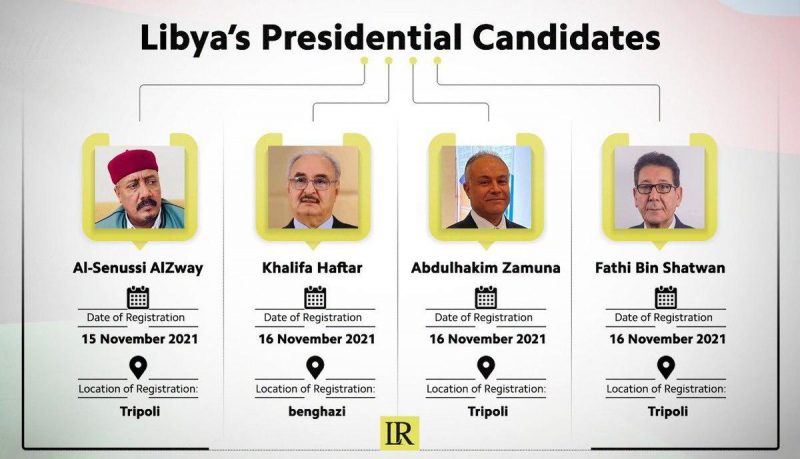
Saif al-Islam Gaddafi
Son of Muammar Gaddafi. He was born on June 25, 1972 in Tripoli. In June 2011, the International Criminal Court issued an arrest warrant for Saif al-Islam Gaddafi for crimes against humanity. He was held captive by the Zintan militia from 2011 to 2017. After his release, he repeatedly declared his readiness to run for president of Libya. He opposes Western influence in Libya.
Abdul Hamid Dbeibeh
Current interim Prime Minister of Libya. He was born in February 13, 1958 in the western city of Misrata. He advocates for the removal of his rivals, Khalifa Haftar and Saif al-Islam Gaddafi, from the electoral process. He maintains relations with all the key external actors: he visited Turkey, organized a lobbying campaign in his favor in the United States and recently decided to sell an 8.16% stake in the Libyan oil company Waha Oil to the French oil giant Total.
Abdul Hamid Dbeibeh, as already noted, is the politician whose candidacy is legally the most problematic. His contacts with France are also questionable. France is a source of destabilization in Libya, as recognized by Libyan politicians. In particular the Chairman of the Libyan High Council of State (HCS) Khalid Al-Mishri voiced this opinion in a recent interview with United World International.
Abdul Hamid Dbeibeh’s attempts to play on the side of France make him a candidate who, if he wins, could turn his back on Turkey.
Khalifa Haftar
Born in November 7, 1943. Commander of the Libyan National Army since March 3, 2015. He is in de facto control of eastern and southern Libya. He is in alliance with France, the UAE and Egypt. Formerly a general in Gaddafi’s army, Haftar defected to the opposition and lived in the U.S. until 2011.
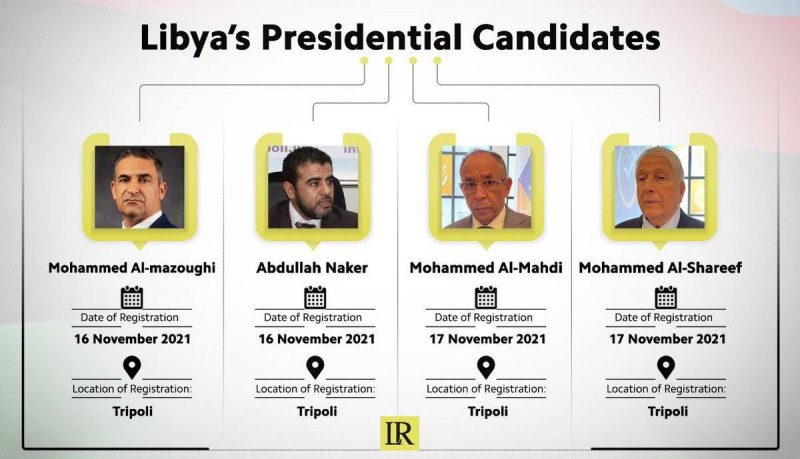
Fathi Bashagha
Born on 20 August 1962 in Misrata, former Minister of Interior of the Government of National Accord (GNA). He enjoys the support of Misrata militias. He is known for his previous pro-American statements (he proposed the USA to establish a military base in Libya).
Ahmed Maiteeq
Born in 1972 in Misrata. He was educated in Italy and Great Britain. Former Deputy Prime Minister of the Government of National Unity. He advocates building friendly relations with Turkey and Russia. In autumn 2020, he made an agreement with Khalifa Haftar, which allowed him to resume the export of Libyan oil.
Ali Zeidan
Born 15 December 1950 in the town of Waddan in South Libya. Zeidan is a former diplomat and Ex-Prime Minister of the Transitional Government of Libya 2012-2014. He holds pro-Western, liberal views and proposes that Western countries actively mediate in Libya’s settlement.
Aguila Saleh Issa
Born on January 11, 1944, in the town of Al Qubbah. He is Speaker of the Libyan Parliament, House of Representatives (temporarily resigned in September 2021 to participate in presidential elections). Albeit politically allied with Khalifa Haftar, Issa often acts on his own political initiatives.
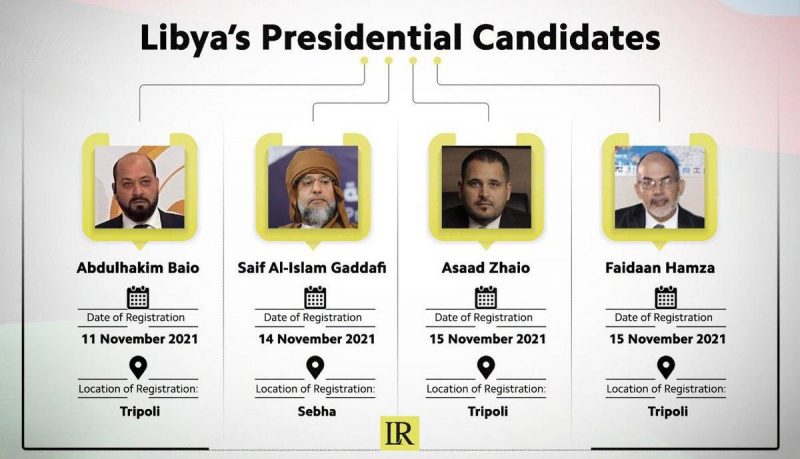
Aref Ali Nayed
Born in Benghazi in 1962. He is the former ambassador of Libya to the United Arab Emirates and today Head of Ihya Libya Party. He is a supporter of Khalifa Haftar. Nayed is the founder and director of Kalam Research & Media (KRM), based in Tripoli and Dubai.
Assad Zhaio
He is Libya’s youngest presidential candidate. He was born on April 22, 1985.
He is a member of the al-Sayahan tribe and co-founder of the youth organization Libyan National Union.
Faidaan Hamza
He is a round 55 years old, politician and public health specialist.
Sheikh Al-Senussi Al-Haleq Al-Zawi
President of the Zawi Tribe Council and Vice President of the Supreme Council of Libyan Tribes. He calls for national reconciliation.
Abdulhakim Zamuna
Lecturer of law at Tripoli University.
Fathi Bin Shatwan
He is the former Libyan Oil Minister. He held various government posts between 1987 and 2006, including that of energy minister between 2004 and 2006. He left the government in 2007.
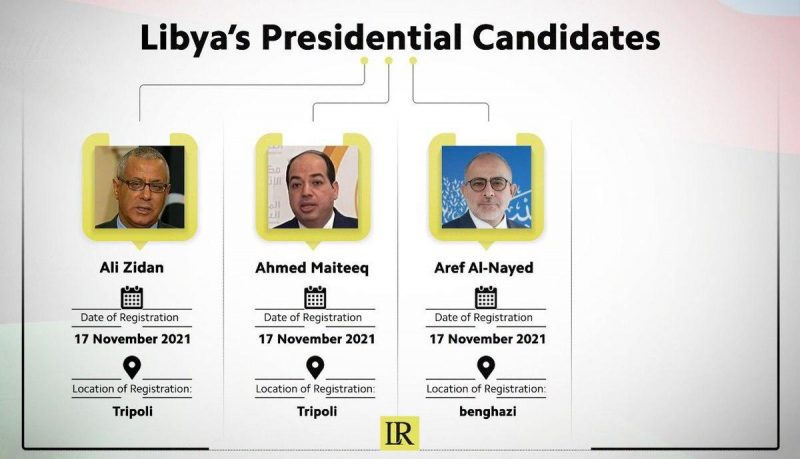
Mohammed Al-Mazoughi
Born March 21, 1973, engineer from Tripoli.
Abdullah Naker
Born 1971 or 1972 in Zintan, Libya, former head of the Tripoli Revolutionist Council (TRC), militia leader.
Mohammed Al-Shareef
Born October 3, 1937. He worked as Libyan Minister of Education in 1970s and is the former Secretary of the Islamic Dawa Society.
Ismael Shtaewi
Businessman and ex-president of Al-Ahli FC. He was born on March 3, 1966. He is known for a number of charitable initiatives.
Othman Abduljaleel
Former Minister of Education in the Government of National Accord Faiz Sarraj.
Bashir Saleh Bashir
Born 1946 in Traghan, South Libya. He is a former associate of Muammar Gaddafi, former head of the Libyan African Portfolio, a sovereign wealth fund that invested Libya’s oil wealth mostly in sub-Saharan Africa.
Laila Ben Khalifa
The head of the Libyan National Movement Party, the first and so far only woman running in the elections.
According to experts, the main struggle will unfold between six candidates: Saif al-Islam Gaddafi, current Prime Minister Abdul Hamid Dbeibeh, Khalifa Haftar, Aguila Saleh, Fathi Bashaga and Ahmed Maiteeq. These are the strongest candidates, backed by domestic factions, with experience in international negotiations, and with supporters inside the country.







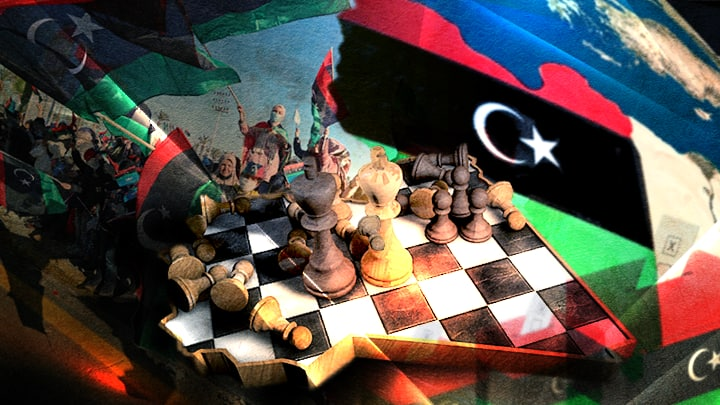







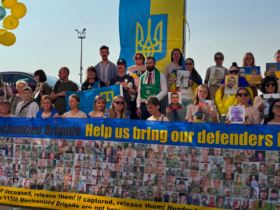

Leave a Reply